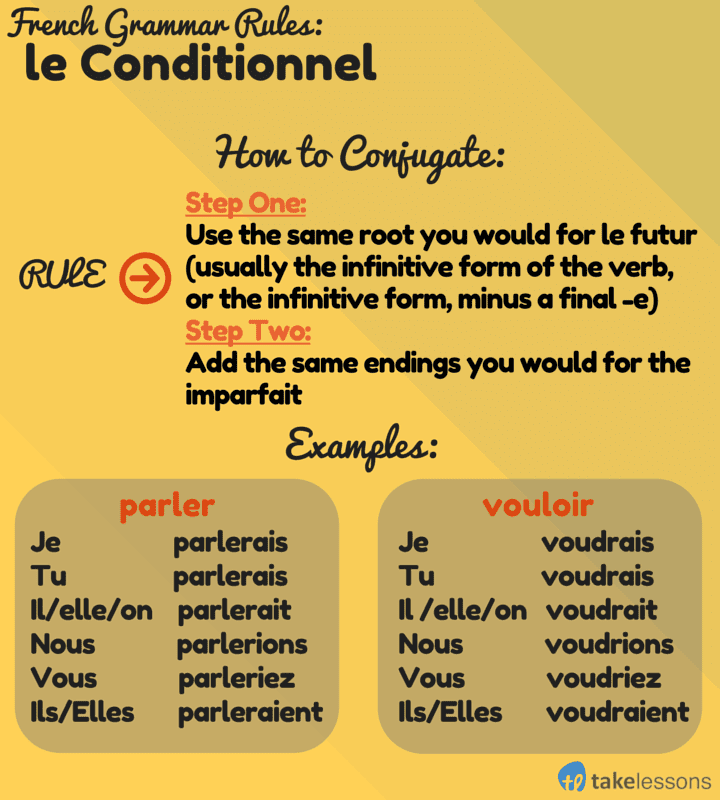If you knew how, would you use the conditional in this sentence? French tutor Carol Beth L. can help you find the answer…
As a beginner or intermediate French speaker, you have likely come across various French verb tenses, such as le présent, passé composé, imparfait, futur, and perhaps even the subjunctive mood. These various features of French grammar express particular time frames, such as what is happening, happened, will happen, or even what may or may not happen. But what about expressing what would have happened? For French speakers, that’s where le conditionnel comes in.
The conditional tense in French (le conditionnel) is used to express actions or events that can or will happen if certain conditions are met. Here are some examples:
- J’irais au supermarché s’il était ouvert.
I would go to the supermarket if it were open. - Elle assisterait a l’école si elle était assez agée.
She would attend school if she were old enough.
Note that le conditionnel is used for the action that is NOT part of the “if” phrase. The second verb in these two examples is conjugated in the imparfait.
Le conditionnel can also be used on its own in a sentence if you are making a polite request or stating something you would like to see happen. Here are two examples:
- Je voudrais du rosboeuf avec des pommes de terre.
I would like some roast beef with potatoes. - J’aimerais aller au Quebec cet été.
I’d like to go to Quebec this summer.
How to Conjugate le Conditionnel
The conditional form is relatively easy to conjugate, because it combines roots and endings you have most likely seen before. Use the same root you would for le futur (usually the infinitive form of the verb, or the infinitive form minus a final -e where applicable), and add the same endings you would for the imparfait. For the verbs parler (a regular verb) and vouloir (which has an irregular root), the conjugations would look like this:
Je → parlerais, voudrais
Tu → parlerais, voudrais
Il/elle/on → parlerait, voudrait
Nous → parlerions, voudrions
Vous → parleriez, voudriez
Ils/Elles → parleraient, voudraient
If in doubt as to which roots are irregular, you can review some of the irregular future roots here.
Time to Practice!
Now that you know how and when to use le conditionnel, try your hand at the example sentences below. Be careful with the sentences that contain two verbs: One will be conjugated using the imparfait, and the other using the conditionnel.
- Si j’ ___________ (étudier) avec lui, je ___________ (pouvoir) réussir mon exam.
If I studied with him, I would be able to pass my exam successfully. - Ils ___________ (aimer) parler avec leur frère.
They would like to speak with their brother. - Si tu ___________ (finir) tes devoirs tous les jours, tu ___________ (avoir) de bonnes notes.
If you finished your homework every day, you would have good grades. - Nous ___________ (vouloir) de la salade.
We would like some salad. - Si vous ___________ (vouloir) aller au Quebec, vous ___________ (garder) votre argent.
If you wanted to go to Quebec, you would keep / save your money.
How do you think you did? Check your answers below:
- étudiais, pourrais
- aimeraient
- finissais, aurais
- voudrions
- vouliez, garderiez
If you didn’t do well, keep reviewing and practicing your French grammar skills. Either way, begin looking and listening for uses of le conditionnel as you listen and read to seek out opportunities to practice using it as you speak and write. Look for someone to correct your usage if you make a mistake, and you will improve quickly!
Want even more practice with le conditionnel? A private French tutor can give you expert advice, study tips, and answers to your questions about French grammar. Search for a French tutor today!
 Post Author: Carol Beth L.
Post Author: Carol Beth L.Carol Beth L. teaches French lessons in San Francisco, CA. She has her Master’s in French language education from the Sorbonne University in Paris and has been teaching since 2009. Learn more about Carol Beth here!
Photo by vahiinee
Megan L.




